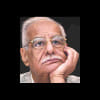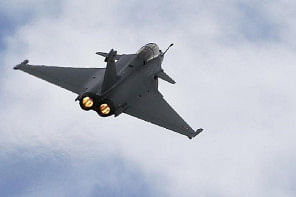RSS-BJP kinship
If there was any iota of doubt about the links between the Rashtriya Swayamsevak Sangh (RSS) and the Bhartiya Janata Party (BJP), Prime Minister Narendra Modi dispelled it. He presented his key ministers to RSS chief Mohan Bhagwat and asked them to provide information on the working of their ministries.
The party has been evasive on the link because of its realisation that the RSS does not go down well with an average Indian. It was the same question of connection which split the Janata Party. The Jana Sangh, the earlier avatar of the BJP, promised to severe its link with the RSS when it joined the Janata Party and gave an assurance to Gandhian Jayaprakash Narayan (JP Narayan) that it would cut off its relations with the RSS, provided it was allowed to stay in the Janata Party. This delinking did not, however, happen and it betrayed JP's confidence.
When I asked JP why he allowed the Jana Sangh (JS) to merge with the Janata Party when the former hadn't cut off its link with the RSS, he said that he felt "personally let down" because the JS leaders had gone back on their words.
This must be true but in the process the Jana Sangh was able to get secular credentials. The blunder committed by JP has cost the nation, and the Jana Sangh of yesterday has emerged as the BJP of today and has been able to secure an absolute majority in the Lok Sabha.
The Congress should have gained from the situation. But its obsession with the dynasty and President Sonia Gandhi's insistence on having her son, Rahul Gandhi, as successor has dissipated the advantage. The party has lost its dependable vote-bank of Muslims. The community is now following either regional parties or even flirting with the idea of supporting Owasi, who is trying to present himself as the sole representative of Muslim leaders, as those in the Muslim League used to do before partition.
The community does not want to go back to parochial politics. Yet, it may have no option except to toy with the idea since the RSS has come out openly on the field to guide the BJP, jettisoning its role of being a pure cultural organisation. That the RSS has not gone through the electoral process does not bother the organization, because it knows that the BJP has to depend on the RSS cadres to win elections.
Nonetheless, it is sad to see on television channels, RSS chief Bagwat making it clear who the boss is, when Prime Minister Modi met him and paraded his ministerial colleagues in front of him. True, the electorate has given a majority to Modi but never did he say during his campaign that when it comes to the country's governance, the RSS would be very much there.
In fact, during his campaign, Modi assured the minorities, particularly Muslims, that whatever be the party's stance in the past, the new slogan was sab ka sath, sab ka vikas. At a few meetings, he went out of the way to make Muslims believe that he would be the best custodian.
Realistically speaking, there has been nothing discriminatory in his way of working so far. However, the fact of the RSS saffronising the educational institutions and making appointments of its own men at key positions is visible. It suggests that Modi is implementing the RSS agenda slowly but relentlessly. It is evident that the Muslims have ceased to count in the affairs of governance. The central cabinet itself has just one Muslim minister and he too has been assigned an unimportant portfolio. Even otherwise, the increasing impression inside and outside the government is that a soft-type of Hindutva has begun to prevail in governance.
The target of the RSS to have a Hindu Rashtra may look distant at present. But Modi still has three and a half years to go. Both he and the RSS chief, who now often meet publicly, seem to be working according to the plan which they have devised at Nagpur, the RSS headquarters. The BJP and its students' wing Akhil Bhartiya Vidyarthi Parishad have no independent thinking. They just follow the script finalised at Nagpur.
This has a different manifestation. Sometimes it appears in the shape of ban on meat and sometimes the dress code and even compulsory teaching of Sanskrit in schools and specific morning prayers in assemblies. The redoing of Nehru Memorial Museum at Delhi is part of the same thinking. The RSS, which was nowhere when the movement to oust the British was fought, is now trying to occupy all the space and parade as the real champion of freedom.
One sadly feels the absence of passion of the freedom struggle and the philosophy of pluralism. Even the name of the architect of modern India, Jawaharlal Nehru, is being systematically erased. For example, the postal stamps of Nehru and Indira Gandhi are being obliterated. The havoc caused in the field of education is terrible. History is being re-written and text books are changed to downgrade the role of leaders that were instrumental in getting us the freedom. It is no surprise that the names of frontiers Abdul Ghaffar Khan and Maulana Abul Kalam Azad, who stood bravely against the Muslim League, are seldom mentioned.
Understandably, the RSS and its affiliated units like the BJP and the Bajrang Dal feel left out when the freedom struggle is mentioned. But they do not have to minimise the freedom struggle itself because that will amount to a great disservice to tomorrow's generations. The important thing is the struggle for independence and the sacrifices made by innumerable people.
The writer is an eminent Indian columnist.

 For all latest news, follow The Daily Star's Google News channel.
For all latest news, follow The Daily Star's Google News channel. 



Comments